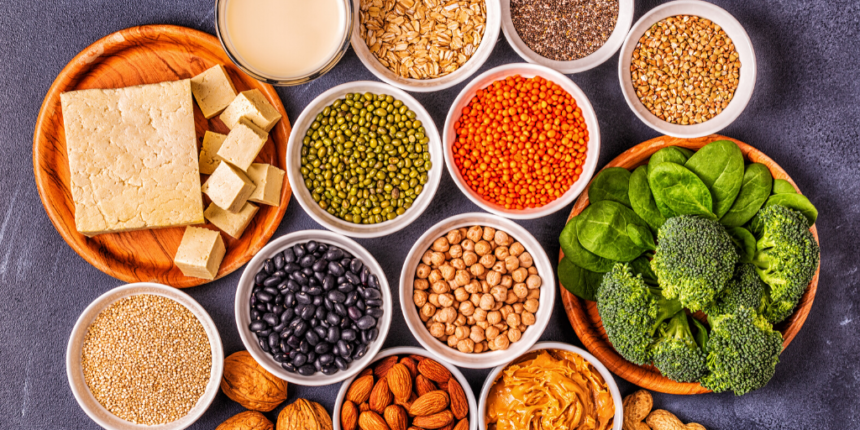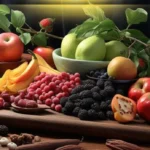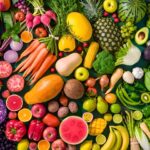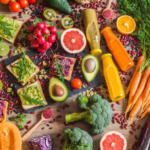Finding plant-based proteins is key for those on a meat-free diet. This guide at wellhealthorganic.com/vegetarian-protein-sources helps you find many meatless proteins. You’ll learn about the benefits and uses of vegetarian protein sources. It’s all about living a balanced vegan lifestyle.
Key Takeaways
- Discover a diverse array of plant-based protein options to meet your daily needs.
- Explore the nutritional profiles and culinary uses of legumes, quinoa, nuts, seeds, and soy products.
- Understand the importance of protein for overall health and how to optimize your intake on a vegetarian diet.
- Learn to combine plant proteins for complete nutrition and create a balanced, meatless lifestyle.
- Gain practical tips for meal planning and preparation to ensure you’re meeting your protein requirements.
Why Protein Matters for Vegetarians
Protein is key for our health. It helps muscles grow, boosts metabolism, and keeps the immune system strong. It also helps us age well. Many think vegetarians can’t get enough protein, but experts say a good vegetarian diet can give you all you need.
Importance of Protein for Overall Health
Getting enough protein is crucial for our bodies. It helps fix tissues, make hormones, and regulate enzymes. Without enough protein, we might feel tired, lose muscle, have a weak immune system, and heal slowly. But vegetarians and vegans can get their protein from many plant-based foods.
Debunking the Myth: Vegetarians Can Meet Their Protein Needs
Many think vegetarians and vegans can’t get enough protein. But, a balanced plant-based diet can give you all the amino acids you need. Studies show most vegetarians and vegans get enough protein without problems.
By eating a mix of protein-rich plants, vegetarians can easily get their daily protein. With good meal planning and a variety of foods, the idea that vegetarians lack protein is just a myth.
Legumes: The Powerhouse of Plant Protein
Legumes like beans, lentils, and peas are packed with plant-based protein. They are also rich in fiber, vitamins, and minerals. This makes them great for your health.
Nutritional Profile of Beans, Lentils, and Peas
Legumes have a lot of nutrients. Lentils give you 18 grams of protein and 30 grams of fiber per cup. Red Kidney Beans have 16 grams of protein and are full of antioxidants. Black Eyed Beans offer 16 grams of protein and are rich in iron, vitamin B, magnesium, and potassium. Chickpeas have 14-16 grams of protein and are full of fiber, carbohydrates, iron, vitamins, and minerals.
Versatility and Culinary Uses
Legumes are very versatile. They can be used in many dishes, from curries and stews to dips and spreads. They are perfect for vegetarians looking for protein in their meals.
By using legumes, vegetarians can easily get enough protein and enjoy a wide variety of foods. Legumes are essential for anyone on a plant-based diet, whether you’re an expert or just starting out.
Quinoa: The Complete Vegetarian Protein
Quinoa is a top choice for plant-based protein. It’s different from other grains because quinoa has all nine essential amino acids our bodies need. This ancient grain from the Andes is packed with nutrients that boost a vegetarian or vegan diet.
Quinoa gives you about 9 grams of protein per cup. It’s also low in fat and high in fiber, great for a vegetarian diet. Its balanced amino acids help vegetarians and vegans get enough protein.
But that’s not all. Quinoa is full of vitamins and minerals like iron, magnesium, B vitamins, and antioxidants. It fits into many vegetarian dishes, from salads and soups to pilafs and casseroles. This makes it easy to get a complete, plant-based protein source.
“Quinoa is a superfood that offers a complete protein profile, making it an excellent choice for vegetarians and vegans who want to ensure they’re getting all the essential amino acids in their diet.”
If you’re a vegetarian, health-focused, or just want to add variety to your meals, quinoa is a great pick. Its amazing nutritional benefits and versatility make it a key part of a vegetarian diet.
Nuts and Seeds: Compact Nutrient Dynamos
Nuts and seeds are great for plant-based diets. They are full of nuts seeds protein and other important nutrients. These foods can really help a vegetarian diet.
Nutritional Benefits of Nuts and Seeds
Nuts and seeds are packed with good fats, fiber, vitamins, and minerals. Almonds are high in vitamin E, while walnuts have omega-3 fatty acids. Pumpkin seeds are a good source of zinc, which is key for a strong immune system.
Incorporating Nuts and Seeds into Your Diet
There are many ways to add nuts seeds to diet. You can put them on your oatmeal, mix them into trail mix, or use them as a topping for salads. Nut butters like peanut or almond butter are also a tasty way to get more nuts into your meals.
Whether you like the taste of cashews, the crunch of sunflower seeds, or the flavor of pecans, nuts and seeds are great for any vegetarian diet. They are versatile and full of nutrients.
“Nuts and seeds are like little nutritional powerhouses – they pack a punch of protein, healthy fats, and essential vitamins and minerals that every vegetarian needs.”
Soy Products: Tofu, Tempeh, and Edamame
Soy-based products like tofu, tempeh, and edamame are great for vegetarians. They are protein-rich and easy to add to meals. These foods are full of nutrients that help vegetarians get enough protein.
Nutritional Advantages of Soy
Tofu is known for its high protein content, with about 10 grams per half-cup. Tempeh gives you 21 grams of protein per cup. Edamame, the young soybeans, has 10 to 12 grams of protein per 100 grams.
Soy is also packed with fiber, vitamins, and minerals. It has all the amino acids your body needs. This makes soy a key part of a vegetarian diet, helping to meet protein goals.
Cooking with Soy Products
Soy products are versatile in the kitchen. Tofu can be marinated, baked, or sautéed. Tempeh can be grilled, crumbled, or added to many dishes. Edamame is great as a snack or in salads and rice bowls.
Adding soy products to your diet helps you get enough protein. It also brings new flavors and textures to your meals. Soy is essential for anyone on a vegetarian diet, whether you’re new or experienced.
Dairy Products: Cheese, Yogurt, and Milk
Lacto-vegetarians can get a lot of protein from dairy items like cheese, yogurt, and milk. These foods are packed with protein and also have important vitamins and minerals. They help make a vegetarian diet well-rounded.
Nutritional Breakdown of Dairy Products
Dairy products are known for their high protein levels. For example, a 6-ounce serving of Greek yogurt has 18 grams of protein. A half-cup of cottage cheese gives you 14 grams. And just one ounce of cheddar cheese has 7 grams of protein.
But that’s not all. Dairy foods are also great for getting calcium, vitamins A and B12, and other key nutrients. These nutrients are important for your health.
| Dairy Product | Protein Content (per serving) |
|---|---|
| Greek Yogurt (6 oz) | 18 grams |
| Cottage Cheese (0.5 cup) | 14 grams |
| Cheddar Cheese (1 oz) | 7 grams |
For lacto-vegetarians, adding dairy to their diet is a smart move. These foods are full of nutrients. They work well with plant-based proteins like legumes, nuts, and seeds. Together, they make a diet that has all the essential proteins.
Eggs: A High-Quality Protein Source
Eggs are not usually thought of as vegetarian food, but many vegetarian Indians eat them. They are packed with high-quality protein and lots of vitamins and minerals. This section talks about the good stuff in eggs and how they can be used in vegetarian cooking.
Nutritional Profile of Eggs
Eggs are full of nutrients. The Dietary Guidelines for Americans say a large egg has 6 grams of protein. This makes eggs a great choice for vegetarians looking for eggs protein. They also have important vitamins and minerals like vitamin A, vitamin D, vitamin B12, iron, and choline.
Versatility in Vegetarian Cooking
Eggs are super versatile in vegetarian cooking. You can boil, scramble, poach, or bake them. They fit into many vegetarian dishes, from ways to use eggs in vegetarian cooking like omelets and quiches to baked goods and custards. Their nutritional value of eggs makes them a great addition to vegetarian meals.
Looking to increase your protein or add some fun to your vegetarian meals? Eggs are a great choice.
Grains and Pseudo-Cereals
Grains and pseudo-cereals are key for vegetarians looking for plant-based protein. They are full of essential amino acids and other nutrients that boost health. These foods are versatile and important for a balanced diet.
Nutritional Value of Whole Grains
Whole grains like brown rice, oats, and whole wheat are full of nutrients. They have protein, fiber, B vitamins, and minerals. These carbs give you energy slowly and keep you feeling full longer.
They also help with digestion and keep your gut healthy. The fiber in whole grains is great for your heart, weight, and blood sugar levels.
- Whole grains are a rich source of plant-based protein, with approximately 4-6 grams per serving.
- They contain a variety of essential vitamins and minerals, including B vitamins, iron, magnesium, and selenium.
- The fiber content in whole grains supports heart health, weight management, and blood sugar regulation.
Adding whole grains to your vegetarian meals is easy and beneficial. It helps increase your protein and gives you many nutrients.
| Whole Grain | Protein Content (per 100g) | Fiber Content (per 100g) |
|---|---|---|
| Brown Rice | 4.3g | 3.2g |
| Oats | 16.9g | 10.6g |
| Whole Wheat | 12.6g | 12.2g |
“Whole grains are a powerhouse of nutrients that can help vegetarians meet their daily protein needs while also providing a host of other health benefits.”
wellhealthorganic.com/vegetarian-protein-sources
Check out the wide variety of vegetarian protein sources at wellhealthorganic.com. This site is your go-to for all things related to getting enough protein without animal products. It’s perfect for both new and long-time vegetarians looking to boost their protein intake and stay healthy.
Our site covers everything from legumes and whole grains to soy products and nuts and seeds. You’ll learn about the nutritional benefits, how to use them in cooking, and why they’re good for the planet. This helps you make smart choices that fit your diet and lifestyle.
Discover our detailed guides, recipes, and expert tips to make tasty, high-protein vegetarian meals. Start improving your plant-based protein intake and move towards a healthier, greener future with us.
“Embracing a vegetarian diet doesn’t mean compromising on protein. With the wealth of plant-based options available, you can easily meet your protein needs and unlock a world of culinary possibilities.”
Discover all the vegetarian protein sources at wellhealthorganic.com/vegetarian-protein-sources. Start your journey to a balanced, healthy, and sustainable plant-based lifestyle today.
Combining Plant Proteins for Complete Nutrition
To get all the protein you need from a vegetarian diet, it’s key to know about protein complementarity. Mixing different plant proteins helps create a full amino acid mix. This makes sure you get all the nutrients you need.
Understanding Protein Complementarity
Some plant proteins don’t have all the essential amino acids. But, when you pair them right, you can get everything your body needs. Quinoa, for example, is a complete protein because it has all nine essential amino acids.
Other great options include seitan (a wheat-based meat substitute) and legumes (beans, lentils, and peas). Mixing these can give you a full amino acid mix. This way, vegetarians can easily get the daily protein they need, which is about 0.8 grams per kilogram of body weight.
- Eating more legumes and veggies not only boosts protein but also fiber, which is good for your gut.
- Dairy like cheese, yogurt, and milk, and eggs are also great protein sources for vegetarians.
- Nuts, seeds, and soy products like tofu and tempeh are easy to add to meals and snacks for extra protein.
By knowing about protein complementarity and mixing different plant proteins, vegetarians can make sure they get all the nutrients for good health and well-being.
“Combining different plant-based protein sources is the key to a complete vegetarian diet.”
Tips for Optimizing Plant-Based Protein Intake
Choosing a vegetarian diet is a great way to eat healthier. But, it’s important to plan well to get enough protein. By eating a mix of protein-rich plants and planning meals, vegetarians can get the most from their diet.
Meal Planning and Preparation Strategies
Getting enough protein as a vegetarian is easier with good meal planning and prep. Here are some tips to boost your plant-based protein:
- Add a variety of protein-rich foods like legumes, quinoa, nuts, seeds, and soy products to your meals and snacks.
- Pair complementary plant proteins, like rice and beans, to make “complete” proteins that have all the essential amino acids.
- Choose whole, minimally processed plant proteins whenever you can for more nutrients.
- Plan your meals ahead to have plenty of protein-rich options all week.
- Do meal prep, like cooking legumes or grains in advance, to make your vegetarian meals easier.
- Try new vegetarian recipes and cooking methods to make your protein-rich meals tasty and fulfilling.
By focusing on meal planning and careful prep, vegetarians can easily meet their protein needs and enjoy a balanced, healthy diet.
“Proper meal planning and preparation are essential for vegetarians to ensure they meet their daily protein requirements and maintain optimal health.”
A balanced vegetarian diet with a mix of protein-rich plants gives you all the nutrients you need. With some planning and creativity, you can easily increase your plant-based protein intake and live a fulfilling vegetarian life.
Conclusion: Embracing a Balanced Vegetarian Lifestyle
This guide at wellhealthorganic.com/vegetarian-protein-sources has shown many plant-based protein sources for vegetarians. It’s key to know how protein is important, the nutrients in vegetarian foods, and how to get enough protein. This way, people can live a balanced, meat-free life that fits their protein needs and helps their health.
Legumes like lentils, chickpeas, and black beans are great for protein. Quinoa is also a complete protein source. Nuts and seeds are packed with nutrients too. Soy products, dairy, and eggs add more high-quality protein options for vegetarians.
Adding these protein-rich foods to daily meals helps vegetarians get enough protein. Mixing different plant-based proteins is a smart way to meet protein goals. This approach supports health, lowers disease risk, and helps with weight management. It also reduces harm to the environment.
FAQ
What are the diverse vegetarian protein sources explored in this article?
This article talks about many plant-based proteins for vegetarians. It includes legumes, quinoa, nuts, seeds, soy products, dairy, and eggs.
Why is protein important for vegetarians?
Protein is key for good health. It helps with muscle growth, metabolism, and keeping the immune system strong. It also helps with aging. The article shows that vegetarians can get enough protein and nutrients with a good diet plan.
What are the nutritional benefits of legumes as a vegetarian protein source?
Legumes like beans, lentils, and peas are packed with protein. They also have lots of fiber, vitamins, and minerals.
How does quinoa contribute to a vegetarian diet?
Quinoa is a complete protein, meaning it has all nine essential amino acids. It’s an ancient grain that boosts the nutritional value of a vegetarian diet.
What are the benefits of incorporating nuts and seeds into a vegetarian diet?
Nuts and seeds are great for plant-based protein. They also have healthy fats, vitamins, and minerals. They’re easy to add to many vegetarian dishes.
How can soy-based products contribute to a vegetarian diet?
Soy products like tofu, tempeh, and edamame are versatile and high in protein. They’re great meat alternatives for vegetarians, offering important nutrients.
What role do dairy products and eggs play in a vegetarian diet?
For lacto-vegetarians, dairy like cheese, yogurt, and milk is a big protein source. Eggs are also common, providing complete protein and other nutrients.
How can whole grains and pseudo-cereals contribute to a vegetarian diet?
Whole grains and pseudo-cereals, like quinoa, add to a vegetarian diet’s protein. They give a steady supply of protein and essential nutrients.
What is the concept of protein complementarity, and how can it benefit vegetarians?
Protein complementarity means combining different plant-based proteins for a complete amino acid profile. This helps vegetarians get all the nutrients they need.
What practical tips are provided for vegetarians to optimize their protein intake?
The article gives tips for vegetarians to get enough protein. It suggests planning meals with various protein-rich foods and being mindful when cooking.
Source Links
- https://wellhealthorganic.com/best-vegetarian-protein-sources-high-protein-foods-for-vegetarians-to-boost-your-health/
- https://wellhealthtips.in/vegetarian-protein-sources/
- https://lyncconf.com/nuts-and-seeds-vegetarian-protein-source/
- https://oldwayspt.org/programs/oldways-vegetarian-network/oldways-vegetarian-network-resources/vegetarian-protein-plant
- https://rakeshinani.com/top-protein-rich-vegetarians-food/
- https://www.linkedin.com/pulse/protein-sources-vegans-vegetarians-subramanyam-chinthalapati
- https://health.clevelandclinic.org/what-is-the-flexitarian-diet
- https://pharmeasy.in/blog/list-of-protein-rich-food-for-vegetarians/
- https://www.eatingwell.com/article/289961/top-vegetarian-protein-sources/
- https://health.clevelandclinic.org/13-of-the-best-vegetarian-and-vegan-protein-sources




